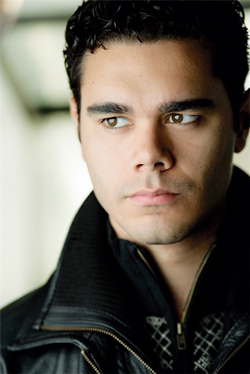by Daniel Hathaway

Madore is best known for his work on the operatic stages of Glyndebourne, Zürich, and The Met, but his personal charm as an interpreter of art song rivals his characterization of such roles as Don Giovanni. In his short program of works by Schumann, Poulenc and Ives, he projected texts with an intensity that resembled Dietrich Fischer-Dieskau. His eyebrows were often as expressive as his dark, rich voice.
The program began dramatically with Robert Schumann’s Belsatzar, a setting of Heinrich Heine’s poem about the fall of the King of Babylon as told in the Hebrew Book of Daniel. Alas, for those who were following the word sheets, Madore’s gripping narrative was suddenly interrupted just as Belshazzar called for the golden vessels he had plundered from the Temple at Jerusalem, and scorned the God of the Hebrews. We turned the page to find that the rest of the text was missing! For those who don’t know the story (full version here), it didn’t turn out well for Belshazzar.
Madore continued with Schumann’s Liederkreis, op. 39, after some informal comments relating the song cycle’s parallels to his own vagabond life as an opera singer. The poetry is by Joseph von Eichendorff, and among his dreamy images, something often goes horribly wrong. The singer meets a lovely woman in the woods who turns out to be the witch Loreley. A wedding party floats by on the Rhine, and while the musicians are playing merrily, the bride is weeping. Twilight brings a feeling of dread: hunters are out to kill deer, and a treacherous friend is plotting war. The singer imagines a garden where his sweetheart is waiting among the roses — but she’s long been dead.
Madore and Katyukova painted vivid individual scenes with each of the twelve songs. Using crisp and often explosive diction, Madore put the German texts across with intense immediacy, but relaxed between each song, smiling, putting his hands in his pockets, and raising those eyebrows meaningfully. Katyukova’s dark, expressive tone and expert sense of timing contributed much to the impact of the cycle.
Francis Poulenc’s witty settings of poetry by Guillaume Apollinaire provided a refreshing contrast after intermission. The subjects of the song cycle Banalités range wildly from the love-sickness of “Chanson d’Orkenise” through the ennui of “Hôtel” (‘I do not want to work, I want to smoke’), to the sadness of “Fagnes de Wallonie” (‘Overwhelming sorrow seized my heart in the desolate uplands’), the effervescent charm of “Voyage à Paris” (‘Delightful Paris that once upon a time love must have created’) to the bleak resignation of “Sanglots” (‘It is the song of the dreamers who tore out their heart and carried it in the right hand…let us leave all to the dead and hide our sobs). Madore put all the varying moods of the Poulenc cycle across with vocal and narrative flexibility and with a keen sense of the emotional shadings of the French poems.
After introducing his family, who had come down from Toronto to hear him, and who Madore said had advised him in planning this recital “not to make it too serious, ” Madore ended his program with individual songs from the wildly varied collection by the American iconoclast, Charles Ives (he wrote 114 of them).
“Circus Band” was great fun (‘last year the lady all in pink waved to me I think’) and gave Katyukova the opportunity to play a big postlude. Ives’s Ich grolle nicht (Heine), set more famously by Schumann in Dichterliebe, was gorgeous in its harmonies and odd melodic quirks. The charming doggerel of “The Side Show” was over in a flash. “Tom Sails Away” (to war), one of a chain of hazy scenes from childhood, was atmospheric, yet found the opportunity to quote the World War I song “Over there.” Two songs grouped under the title “Memories” captured the excitement of children waiting for the show to start in the opera house (at the end, Katyukova shouted, “Curtain”), then reminisced about the tune that the Ives’s uncle hummed (“a tune as threadbare as that ‘old red shawl’”). Madore sang that sotto voce and hummed at the end.
The mid-sized audience, full of singers, singing teachers and vocal connoisseurs, gave Madore and Katyukova a warm ovation. In response, the baritone put on his opera persona for a beautiful encore: Don Giovanni’s serenade aria.
This recital was a fine way to keep the art song tradition in the public eye between the biennial editions of the Art Song Festival itself. Before the performance, founder and artistic director George Vassos announced that the special guest performers during the 2016 Festival will be baritone Edwin Crossley-Mercer and mezzo-soprano Susan Graham, who will give solo recitals on May 24 and May 26, respectively.
Published on ClevelandClassical.com March 17, 2015.
Click here for a printable copy of this article


